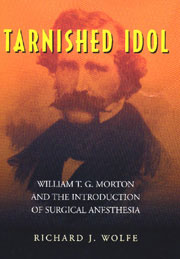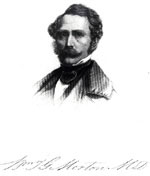Publications Surgery (also found under Anesthesia)
Tarnished Idol:
William Thomas Green Morton and the Introduction of Surgical Anesthesia. A Chronicle of the Ether Controversy.
Richard J. Wolfe
Out of Print
The first comprehensive biography of the life of W. T. G. Morton and his role in the introduction of surgical anesthesia and the controversy that ensued. Much of the information that is included has never before been published.
688 pages. 60 illustrations. Cloth, dust jacket, acid-free paper. 7" × 10". ISBN 0–930405-81–1. NP37805. July 2001.
» Skip to: About the Author | Reviews
Tarnished Idol is the first serious, scholarly biography of William T. G. Morton, the self-trained Boston dentist who is credited with demonstrating to the medical profession in 1846 the efficacy of sulfuric ether in allaying the pain of surgery. It is also the first detailed analysis of the “ether controversy,” which grew out of Morton’s association with the physician-chemist Charles T. Jackson, who claimed to have given Morton the vital clues that led to his success.
The controversy arose after Morton patented the discovery and attempted, over Jackson’s protestations, to reap a fortune from the controlled use of ether in surgery and dentistry. As a result, Morton spent much of the remainder of his life unsuccessfully trying to convince Congress that he was the discoverer of anesthesia, all in the expectation of receiving a large cash reward. Of the four book-length biographies of Morton previously published, two, by Benjamin Perley Poore (1856) and Nathan P. Rice (1859), were undertaken with Morton’s blessing and collaboration to help him justify his claim and cannot be considered as impartial or as much more than promotional literature. Two more recent biographies, by Rachel Baker (1946) and Grace Steele Woodward (1962), are semi-fictional, popular accounts that rely overly on the Rice biography for their orientation and facts.
Tarnished Idol does not depict Morton heroically, as the other accounts do. Through exhaustive research in genealogical and land registry records as well as unpublished correspondence and manuscript sources, by continual reference to the contemporary newspaper and medical press, and through detailed examinations of Congressional testimony and debate, Mr. Wolfe presents a much different picture of Morton’s life and involvement in the anesthesia story than previously reported. Such evidence has enabled him to clearly show that William T. G. Morton was little more than an opportunist with only slight scientific knowledge and possessed of a highly flawed character, whose main goal in life was the accumulation of money, no matter how gained. From his boyhood wanderings in the Midwest in pursuit of a business career that featured forging, swindling, and thievery, crimes that on at least two occasions nearly resulted in his apprehension and imprisonment, to the street-fighting tactics he employed during his several appeals to Congress, his mindset never changed. Tarnished Idol furnishes ample proof that Morton’s personality and character deficiencies conditioned him to be totally unworthy and ill-prepared for the role he was to play when, by some odd twist of fate, he was chosen to help usher in one of the greatest advances in all of medicine. Time and again his errors of judgment and ill-conceived decisions resulted in disappointment, heartbreak, and, ultimately, tragedy for himself and for many of those with whom he interacted.
In addition to examining Morton’s claim and all of the counterclaims to the discovery of anesthesia (Horace Wells, Jackson, Crawford W. Long, and others), Tarnished Idol provides a rich slice of American history in the antebellum era, flavored by glimpses of many outstanding personalities who trod the American scene of that period, including Ralph Waldo Emerson, Richard Henry Dana, Oliver Wendell Holmes, William Seward, Stephen Douglas, Edward Everett, and Jefferson Davis. It also raises some thought-provoking questions about the rewards of medical discovery and the ethics of attempting to profit too greatly from it. Much of the information in Tarnished Idol relating to Morton’s life and the ether discovery and controversy appears here for the first time. This momentous work will surely stand as one of the most important analyses and chronicles of both a fascinating and controversial life and a significant episode in American history and achievement, arguably America’s first great contribution to medicine.


About the Author
A professional librarian for forty-five years with a keen interest in history and writing, Richard J. Wolfe trained at the University of Pittsburgh (the city where he was born), The New York Public Library, and the Lilly Library of Indiana University. From 1965 to 1997 he was Curator of Rare Books and Manuscripts at Harvard University’s Francis A. Countway Library of Medicine and for most of that time was also Joseph Garland Librarian of the Boston Medical Library. The author, compiler, editor, or publisher of more than sixty books, he and his wife reside in Philadelphia. In 2007 he issued the first full-length study of Charles Thomas Jackson, a key figure in the discovery of surgical anesthesia: Charles Thomas Jackson: “The Head behind the Hands.”
Reviews
“[T]he first scholary biography of this figure so important in medical history, an exhaustive work that includes much new material. Recommended for all medical history collections.”
—June 2000 issue of Library Journal
“Tarnished idol is an apt description of William Thomas Green Morton. After his successful demonstration of surgical anesthesia in the Ether Dome of the Massachusetts General Hospital on October 16, 1846, Morton attained the status of a hero. But he himself besmirched that reputation by a reckless pursuit of fame and money and an underhanded way of denying recognition of the contributions of others to the discovery. In this book, Richard Wolfe, former librarian at the Countway Library of Harvard Medical School, examines both aspects of Morton’s character.
“Wolfe’s study of Morton entailed an exhaustive examination of court records, newspaper articles, personal letters, and two 19th-century biographies. Morton himself commissioned one of these biographies and wrote large sections of it to promote his claim to be the sole discoverer of surgical anesthesia. Wolfe traces Morton’s career as an unsuccessful businessman, an embezzler and a cheat, and a poorly trained dentist who saw in the anesthetic properties of ether an opportunity to become rich. The book reviews the legal, personal, and publicity battles between Morton’s competitors—the dentist Horace Wells and the chemist Charles Jackson—for recognition by the French Academy and the U.S. Congress as the discoverer of surgical anesthesia. Many others have written about these events, but Wolfe gives the story fresh life with his inclusion of new material, attention to detail, and insightful analysis of character and situations.
“Wolfe’s scholarship is meticulous, his writing clear, and his thesis convincing. He has written not only a definitive biography of Morton but also a fascinating account of the rough-and-ready character of 19th-century American medicine, politics, and society. The book is large, but then so is the subject. Only the most avid medical historians may wish to read it from cover to cover; more casual readers may read only sections of the book and still enjoy it. It contains a wonderful trove of stories, commentary, and information.”
—Donald Caton, M.D. New England Journal of Medicine, January 3, 2002.
Copyright © 2002 Massachusetts Medical Society. All rights reserved.
The New England Journal of Medicine is a registered trademark of the MMS.
“[Wolfe] presents a very different picture from the standard view of the post-anaesthesia events. His book is long and detailed; no stone remains unturned, and his findings are recounted exhaustively. Nonetheless he writes fluently, graphically, and with touches of dry humour…surely this work will stand as the final account.”
—Aileen K. Adams, in Journal of the Royal Society of Medicine 95 (May 2002).
“[Wolfe] comes well prepared to take on the challenge of revealing the truth submerged under the gross misrepresentations and misapprehensions that have characterized historical studies of the Morton-Jackson-Wells-Long contentiousness. Having raged for more than a century and a half, the arguments are now clarified. It is always risky to anoint one or another biography as the definitive one, but not in the case of Tarnished Idol. Wolfe’s encyclopedic study of the unprincipled career of William Thomas Green Morton will not be surpassed.”
—Sherwin Nuland, MD in Journal of the History of Medicine 57 (July 2002).
“There can be no doubt that Wolfe has written the definitive biography of William Morton and that he has set the record straight regarding Morton’s claims to exclusive priority in the discovery of anesthesia…The illustrations, some of them not previously seen by the public, are a fine addition.”
—Amalie M. Kass, in The New England Quarterly (2002), pp. 487-92.
« back to all Surgery Publications
back to top



